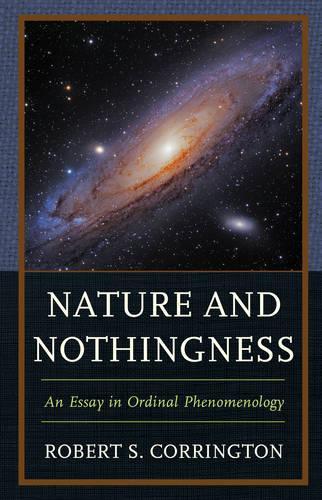
Nature and Nothingness: An Essay in Ordinal Phenomenology
(Hardback)
Available Formats
Publishing Details
Nature and Nothingness: An Essay in Ordinal Phenomenology
By (Author) Robert S. Corrington
Bloomsbury Publishing PLC
Lexington Books
23rd January 2017
United States
Classifications
Professional and Scholarly
Non Fiction
Wildlife: general interest
Essays
142.7
Physical Properties
Hardback
186
Width 160mm, Height 239mm, Spine 19mm
431g
Description
Is nothingness found in nature or is it in some realm disconnected from nature Nature and Nothingness: An Essay in Ordinal Phenomenology argues for the former and explores four types of nothingness as found in nature: holes in nature, totalizing nothingness in horror, naturing nothingness, and encompassing nothingness. Using ordinal phenomenology, Robert S. Corrington reveals the great perennial fissuring within the one nature that there is. The book includes a detailed analysis of religious violence as it correlates to the hoes in nature, such as anxiety, bereavement, loss, fear of fragmentation, and loss of identity. It also examines the various ways in which horror is encountered in a literary context, using the work of Edgar Allen Poe and H. P. Lovecraft. The analysis is comparative and makes use of feminist philosophy as well as Buddhist, Taoist, theosophical, and American philosophy. Using resources from ecstatic naturalism and deep pantheism, Corrington argues that though nothingness takes many forms, they are all guises of the same vast Nothingness.
Reviews
This book is an important continuation of Robert S. Corringtons Ecstatic Naturalism and further expands his thesis on the dangers of tribalism and dogmatic religion within the context of the nothingness that individuals and communities encounter in nature. Corringtons signature aptitude for drawing on a broad range of philosophical, theological, and psychoanalytic thinkers to inform his ideas is especially pronounced in this book, which is one in a series of works on Ecstatic Naturalism that focuses on the inherent challenges and potencies of the Selving process. Nature and Nothingness is a must-read for anyone who is interested in gaining a keener insight into the semiotic richness of the realm of nature that is often underestimated or simply ignored. -- Abigail T. Wernicki, Reading Area Community College
With Nature and Nothingness: An Essay in Ordinal Phenomenology, Robert Corrington continues his audacious and at times lyrical inquiry into the dynamic plenitude and potencies of the Orders of Nature, the world we live in. Extending and deepening our understanding of Ecstatic Naturalism and Deep Pantheism, deftly bridging the traditional gaps between American, Continental, and Asian thought, this work demonstrates how much of substance and significance the concept of Nothingness can yield. -- Robert W. King, Utah State University
With a deep contemplation of nature as betweenizingnature naturingandnature natured, Robert S. Corrington offers this brilliant masterpiece of nothingness and nature as marvelous logarithmic spirals that generates spatio-temporal holes in nature. InNature and Nothingness: An Essay in Ordinal Phenomenology, Corrington unfolds the complex spirals of nature like a series of panoramic circles of nothingness. ThroughGod-ing/Selvingprocess, Corringtons nothingness realizes the whole encompassing nothingness without overlooking naturesdukkha(suffering), rupture, tragedy, shadow, horror, andhimsa(violence). Totalizing nothingness of religion is being stripped andurgeda turning back,involutionto naturing nothingness. This dramatic process toward encompassing nothingness takes a comparative methodology via Buddhist-Daoist-Ecstatic Naturalist dialogues. Presenting an ethic of nothingness, the how of nature, this book is Corringtons most practical to date. -- Jea Sophia Oh, West Chester University of Pennsylvania
In this ground-breaking books, Corringtons insight that the depth of nature as all that is is nothingness is mediated by the American intellectual tradition of interpretation which is the Peircean semiotics. Partly due to his depth language, Corrington has been an unsung hero for the American intellectual tradition. With this book, Corrington at last reaches at the East Asia. This ground-breaking work is a big progress for ecstatic naturalism and American intellectual tradition in that ecstatic naturalism now comes to be an intellectual partner with East Asian thought as well as Buddhism. -- Iljoon Park, Methodist Theological University
Author Bio
Robert S. Corrington is Henry Anson Buttz Professor of Philosophical Theology at Drew University.
